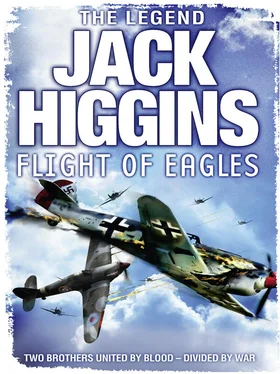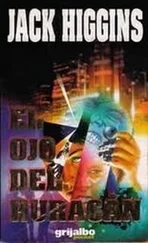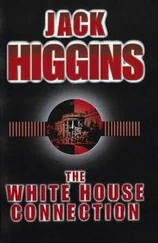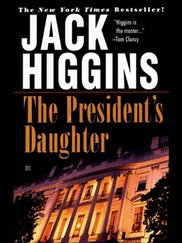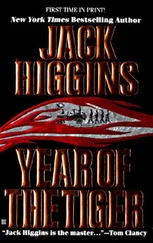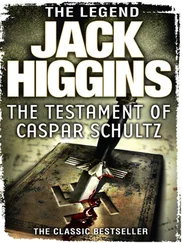A little while later, the aroma of frying bacon took me to the kitchen, where Zec had made sandwiches. I sat at one end of the table, drank tea you could have stood a spoon up in and ate the sandwiches and felt on top of the world.
‘Phone call okay?’ he asked.
‘Oh, yes,’ I told him. ‘A relative of mine. If anyone can find out the German side of things as regards Max Kelso, he can.’
‘You seem pretty certain.’
‘Oh, I am. He’s a lot like you, Zec. Seventy-seven, seen it all, has the right connections.’ I poured another cup of tea. ‘He was in the Gestapo during the war.’
He almost fell out of his chair laughing. ‘Dear God.’
I said, ‘You’ve told me everything you can?’
‘Of course not. Let’s see what you come up with, then we’ll look at any missing pieces.’ He got up. ‘Must check the beer kegs. I’ll see you later.’
After breakfast. I went to the end of the jetty, lit a cigarette and stared out into the fog, thinking about it all. Denise turned up about ten minutes later, in a huge sweater and jeans obviously intended for a man. She was holding two mugs of tea.
‘I thought you might like a wet. I’ve been on to Goodwood Aero Club. Bernie Smith’s flying down to pick us up.’
‘That’s good.’ I drank a little and put an arm about her waist. ‘Thanks!’
‘Bad night?’
‘The German connection. Things you never knew about. The border a long, long time ago. Ireland, the Troubles. It all went round and round.’ I hesitated. ‘You mentioned that cousin of mine in Hamburg, the one who’d been in the Gestapo.’
‘So?’
‘I phoned him earlier. He’s still in Hamburg. He has the kind of past that gives him access to things.’
‘Was he willing to help?’
I gave a deep sigh. ‘Absolutely delighted. Turns out he’s got lung cancer. He said the problem would give him a new lease on life, but not for long, I should imagine.’
She held me tight. ‘How rotten for you.’
How rotten for me? I said, ‘Let’s go back to the pub. You could do with some breakfast. Konrad will come up with something. Hot stuff, the Gestapo.’
He did, of course, performed magnificently and also died six months later. Pieced together from what he uncovered, and from what Zec told me, and from some researches of my own, this is what we found out: the true and remarkable story of the brothers Kelso.
1917
August 1917. At 10,000 feet over the lines in France, Jack Kelso was as happy as any human being could be. Twenty-two years of age, and the scion of one of Boston’s finest and richest families, he could have been doing his final year at Harvard, but instead, he was working through his second year with the British Royal Flying Corps.
The aircraft he was flying was a Bristol fighter, one of the great combat aircraft of the war, a two-seater with an observer-gunner in the rear. Kelso’s sergeant, who had taken shrapnel the day before in a dogfight, had been hospitalized and Kelso, a hotshot pilot with a Military Cross and fifteen German planes to his credit, had illegally taken off on his own. Well, not quite on his own, for sitting in the bottom of his cockpit was a bear called Tarquin in leather helmet and flying jacket.
Kelso tapped him on the head. ‘Good boy,’ he said. ‘Don’t let me down.’
At that period, the British War Office still banned parachutes on the argument that their use made cowards out of pilots. Jack Kelso, a realist and a rich young man, sat on the very latest model, his private possession.
He was a realist about other things as well: Always watch for attacks out of the sun. Never cross the line under 10,000 feet on your own.
The great von Richthofen once shot down four Bristols in one day and there were reasons. The pilot had a fixed machine-gun up front, a Vickers. The observer carried two free-mounting Lewis guns in the rear, which meant the man in the back did all the shooting. After a series of disasters, it had been pilots like Kelso who’d discovered that the plane was so manoeuvrable that she could be handled like a single-seater.
The weather was bad that morning, wind and rain, thick storm clouds and in the noise and confusion, Kelso wasn’t even aware what kind of plane it was that made his luck run out. There was a roaring, a shadow to port, machine-gunfire ripping the Bristol apart, a bullet tearing into his left leg and then he descended into the safety of heavy cloud.
He turned back towards the British lines, to 7000 then 5000 and was aware of a burning smell. He made 3000, flames flickering around his engine. There was the briefest glimpse of the trenches below, the battlefields of Flanders. Time to go. He unbuckled his seat-belt, picked up Tarquin and stuffed him inside his heavy leather coat then turned the Bristol over and dropped out. He fell for 1000 feet, pulled his ripcord and floated down.
He landed in a shell hole half filled with water, unsure of whether he was on the British or German side of the trenches, but his luck was good. A khaki-clad patrol half plastered in mud reached him in a matter of minutes, clutching rifles.
‘Don’t shoot, I’m Flying Corps,’ Kelso shouted.
There was a burst of machine-gunfire in the vicinity. As two soldiers unbuckled Kelso’s parachute, a sergeant lit a cigarette and put it between his lips.
‘Funny accent you got there, Captain,’ he said in ripest Cockney.
‘American,’ Kelso told him.
‘Well, you’ve taken your time getting here,’ the sergeant told him. ‘We’ve been waiting since 1914.’
The field hospital was in an old French château which stood in glorious parkland. The trip out of the war zone had been hazardous and Jack Kelso had lapsed into unconsciousness thanks to the morphine the infantry patrol had administered. He awakened to a fantasy world: a small room, white sheets, French windows open to a terrace. He tried to sit up and cried out at the pain in his leg, pulled the sheets to one side and saw the heavy bandaging. The door opened and a young nurse in a Red Cross uniform entered. She had blonde hair, a strong face and green eyes and looked to be in her early twenties. She was the most beautiful thing he had ever seen in his life and Jack Kelso fell instantly in love.
‘No, lie back,’ she said, pushed him down against the pillows and adjusted his sheets.
An Army colonel entered the room wearing Medical Corps insignia. ‘Problems, Baroness?’
‘Not really. He’s just confused.’
‘Can’t have that,’ the colonel said. ‘Taken a rather large bullet out of that leg, old son, so you must behave. A little more morphine, I think.’
He went out and she charged a hypodermic and reached for Kelso’s right arm. ‘Your accent,’ he said. ‘You’re German and he called you Baroness.’
‘So useful when I deal with Luftwaffe pilots.’
She started to go and he reached for her hand. ‘I don’t care what you are as long as you promise to marry only me, Baroness,’ he said drowsily. ‘Where’s Tarquin?’
‘Would that be the bear?’ she asked.
‘No ordinary bear. I’ve shot down fifteen planes and Tarquin was always there. He’s my good luck.’
‘Well, there he is, on the dressing-table.’
And so he was. Jack Kelso got one clear look. ‘Hi there, old buddy,’ he called then drifted into sleep.
Baroness Elsa von Halder had been trapped in Paris with her mother when the war began. At twenty-two, her father an infantry general killed on the Somme, she was from fine old Prussian stock with a decaying mansion and estate, and absolutely no money at all. As the days passed, Kelso filled her with tales of his privileged life back in the States, and they found they had something in common: both had lost their mothers in 1916, in each case to cancer.
Читать дальше
